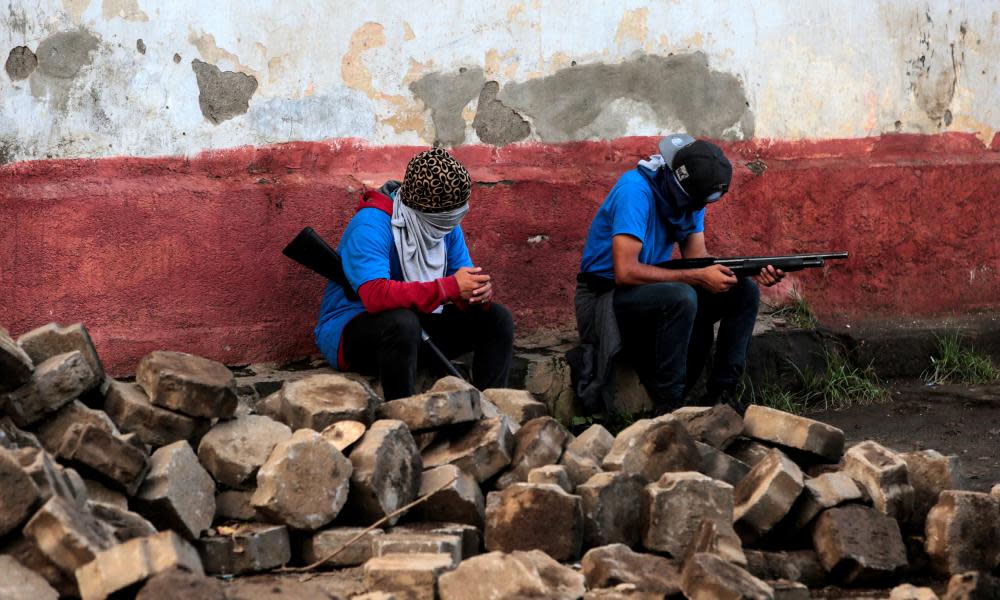Nicaragua: at least four dead as security forces retake rebel stronghold

At least four people are reported to have been killed after Nicaraguan security forces flooded a symbolic rebel stronghold south of the capital, three months after the start of a nationwide revolt against the president, Daniel Ortega.
Police and paramilitary forces stormed the Monimbó neighbourhood in Masaya, a city 16 miles (26km) from Managua, early on Tuesday, tasked with reclaiming its barricaded streets from mortar-wielding rebels who have taken control since anti-government protests started in April.
Masaya’s chief of police, Ramón Avellán, told reporters residents had been pleading to be freed from the “delinquents and terrorists” he claimed had seized control. “And we’re going to do it whatever the cost.”
Rosario Murillo, the country’s vice president and first lady, told state media it was time to reclaim Central America’s largest nation from what she called the hate-filled, right wing coup mongers bent on toppling Ortega, the former leftwing Sandinista hero who was re-elected in 2006 but critics accuse of increasingly authoritarian rule.
Opposition activists and newspapers, senior Catholics and members of the international community accused authorities of ordering the latest in a series of brutal crackdowns designed to silence those demanding Ortega’s exit.
“It was an appalling attack on civilians,” said La Prensa, an opposition broadsheet. The newspaper said Tuesday’s operation had left four people dead, three civilians and a police officer whom it named as Kevin Javier Rivera Laine. La Prensa said Laine had been shot in the head but did not say who was responsible.
“State-sponsored violence against peaceful students, church leaders, journalists & civic leaders in Nicaragua cannot be tolerated,” the United States’ vice-president, Mike Pence, tweeted on Wednesday. “Ortega’s repression must end & the will of the people must be heard.”
Activists say more than 300 lives have been lost since the protests began, the majority of them Ortega opponents killed by state forces or government-sponsored paramilitary gangs.
On Monday Rupert Colville, the UN’s human rights spokesman, told reporters the dead included 19 police officers but added: “The great majority of violations are by government or armed elements who seem to be working in tandem with them.”
As troops streamed into Masaya on Tuesday, the United States’ ambassador to the Organization of American States (OAS) urged Ortega to halt what he called “this genocide”. “The government’s repeated acts of violence and repression will only lead to further isolation and sanctions,” tweeted Carlos Trujillo.
A Reuters reporter in Masaya said Tuesday’s clashes had lasted more than four hours and had pitted hooded government loyalists with automatic weapons against youths wielding homemade mortars. Reuters said the confrontation left Monimbó, an indigenous community which played a key role in the Sandinista revolution in 1979, strewn with broken glass and shell casings.
By the afternoon, opposition protesters had melted away from the barricades and the streets were reportedly under the control of dozens of armed police. Online videos showed jubilant troops dancing to a song whose lyrics boasted: “Daniel! Daniel! The people are with him!”
Silvio José Baez, the auxiliary bishop of Managua, denounced the incursion as “a massacre” but Reuters said some locals had also welcomed it. “It was the only way, because they [the protesters] also had weapons,” claimed Juan Pilarte, a 47-year-old shoemaker who said he had lost his job because of the protests.
The push into Masaya came as the government’s crackdown on opposition protesters intensified ahead of a key Sandinista anniversary on 19 July. Thursday marks 39 years since the rebel troops overthrew the brutal rightwing authoritarian Somoza dictatorship.
Last Friday pro-government militias launched what witnesses described as a terrifying all-night assault on a Managua university campus at the heart of attempts to unseat Ortega.
Facing growing international condemnation – on Monday 13 Latin American countries demanded an immediate end to the “acts of violence and intimidation against Nicaraguan society” – Nicaragua’s government and its supporters have launched an increasingly forceful push-back against critics.
On Tuesday, Nicaragua’s foreign ministry accused the UN’s Office of the High Commissioner for Human Rights of being an accomplice to the “terrorist groups” it claimed were trying to bring down a democratically elected government.

 Yahoo News
Yahoo News 
